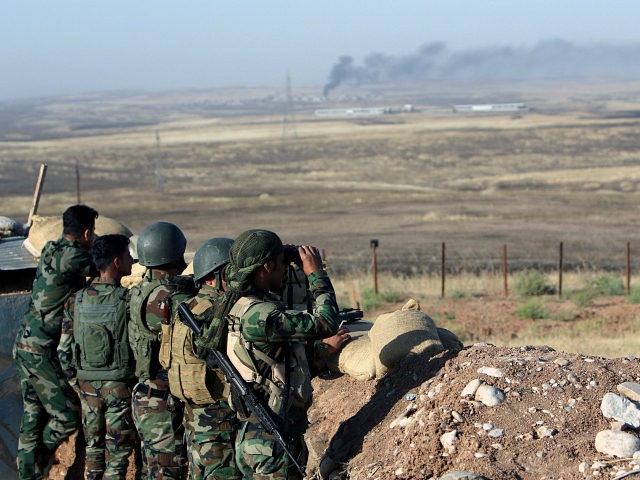WASHINGTON, D.C. — The U.S. military has not “relaxed” the rules of engagement (ROE) to avoid civilian casualties in the ongoing fight against the Islamic State (ISIS/ISIL), commonly known for using the home of innocent people as shelter and the inhabitants as shields, the top American commander in the region told lawmakers.
On Wednesday, American Gen. Joseph Votel, the chief of U.S. Central Command (CENTCOM), told the House Armed Services Committee:
The nature of this fight has evolved over the course of the operation on this two and a half year campaign, and our approach has evolved as well. One example of how we have evolved has been our effort to enable and entrust our leaders at the tactical edge with the authorities they need to help our partners win. We have not relaxed the rules of engagement.
I have authorized Lt. Gen. [Stephen] Townsend to delegate the employment of rules of engagement to the appropriate level due to the tough urban fight that we knew was coming in Mosul. To be clear, there were no changes… to the rules of engagement that allows us to engage.
Gen. Townsend is the top commander of U.S. ground troops in Iraq.
Votel’s testimony came in response to an allegation by a human rights group that a recent decision to loosen the U.S. military’s rules of combat continues to fuel an ongoing spate in civilian casualties in the besieged Iraqi city of Mosul.
The Amnesty International report explicitly highlights the death of an estimated 150 people in a U.S.-led coalition airstrike on March 17, calling it “one of the deadliest strikes in years.”
Gen. Votel stressed that the U.S. military is investigating the allegation.
Wednesday’s House panel hearing was focused on security challenges faced by Gen. Votel in his area of responsibility (AOR), which includes the Middle East and Northeast Africa as well as South and Central Asia.
Echoing Gen. Townsend, the CENTCOM chief told House lawmakers, “There is a fair chance that our operations may have contributed to civilian casualties [in Mosul]. But I would highlight to each of you that this investigation continues, and there is still much to learn from this.”
Gen. Votel noted that the U.S. had assigned a general officer to dig up the facts of the incident and help the American military address the situation, adding:
While we consider and establish accountability over our actions in this incident, I think is also important to clearly recognize that the enemy does use human shields, has little regard for human life and does attempt to use civilian casualty allegations as a tool to hinder our operations. And so they bear responsibility for this as well.
Nevertheless, Amnesty’s report suggests that a loosening of American military combat rules under President Donald Trump are to blame for the high number of civilian casualties in Mosul.
“The high civilian toll suggests that coalition forces leading the offensive in Mosul have failed to take adequate precautions to prevent civilian deaths, in flagrant violation of international humanitarian law,” proclaimed Donatella Rovera, the senior crisis response adviser at Amnesty International, who carried out field investigations in Mosul.
Alluding to the rise in civilian fatalities in Mosul, Votel told lawmakers, “This should be an indicator to you of how intense of a combat situation this is,” later adding, “The investigation [into the March 17 strike] will confirm or deny our initial impressions and highlight the lessons learned.”
The U.S. military believes ISIS may have rigged the building targeted by the coalition on March 17 with explosives after forcing civilians to hide inside.
However, Amnesty insists alleged evidence collected in Mosul “points to an alarming pattern of U.S.-led coalition airstrikes which have destroyed whole houses with entire families inside.”
Gen. Votel declared Wednesday:
These are absolutely tragic and heartbreaking situations, And our hearts go out to the people of Mosul and of Iraq and other places where we are operating. We acknowledge our responsibility to operate at a higher standard. It is my responsibility as a combatant commander to ensure that our forces operate in accordance with those goals and standards.
We take every allegation seriously, and we are executing…a well-developed process to assess — and if necessary investigate each of these allegations…we are doing everything humanly possible to prevent these types of events and incidents from occurring as a result of our operations.
The U.S.-led coalition and its Iraqi allies believe Mosul in Iraq and Raqqa in Syria are ISIS’s last major strongholds in their ever diminishing so-called caliphate.

COMMENTS
Please let us know if you're having issues with commenting.